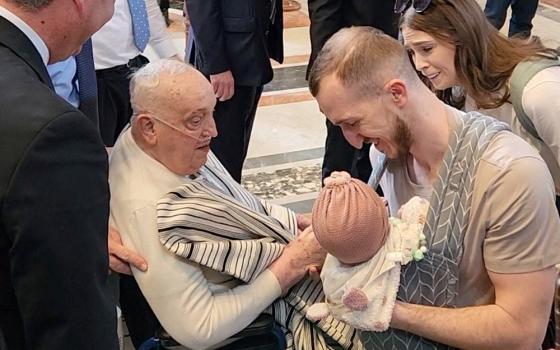The Vatican's new internal financial oversight procedures recognize that human beings can make mistakes, but that the Catholic church as a whole has an obligation to handle the money it receives with honesty and great care, said the head of the Vatican budget office.
Cardinal Giuseppe Versaldi, head of the Prefecture for the Economic Affairs of the Holy See, told reporters Thursday that the new regulations for his office and its oversight of the budgets of all Vatican offices were designed to ensure "the correct and transparent use of the temporal goods of the church."
"It's not that we don't trust people," he said, "but because as Catholics we recognize the existence of original sin," so structures must be in place to correct errors "with charity in truth."
The prefecture, established by Pope Paul VI in 1967, functioned mainly as the Vatican's central accounting office, consolidating the budget forecasts and the year-end budget reports of Vatican offices.
The new rules give it broader responsibilities for guiding the budgeting process, planning and coordinating the economic activities of Vatican offices and entities, as well as studying the budgets and accounting procedures of different offices and monitoring situations in which an office goes significantly over budget.
At the news conference, Versaldi was asked about remarks he made to the Synod of Bishops in October saying that cases of suspected financial mismanagement within the church should be investigated internally, giving the person responsible an opportunity to make amends without publicizing the case, which could lead to scandal.
"There is not an opposition, but a difference between internal and external transparency," he said at the news conference Thursday. He said what he objects to is "an automatic and uncritical reporting of what happens in the church" without a thorough investigation being conducted and without giving a person the opportunity to make amends.
The cardinal said the new rules were not a direct response to requests made by "Moneyval" -- the Council of Europe's Committee of Experts on the Evaluation of Anti-Money Laundering Measures and the Financing of Terrorism -- though its recommendations regarding Vatican financial practices "are an occasion to move forward."
The Vatican had requested a Moneyval evaluation in 2011 as part of a process begun in 2010 to enact tighter finance laws and regulations.
"Working with more transparency makes us more convincing and, in fact, increases the generosity of the faithful," Versaldi said. "Therefore, we must be stringent in administering our temporal goods in justice, truth and charity."
"Like almost every country in the world," he said, the Vatican was expected to end 2012 with another budget deficit, even though it has been attempting to cut spending.
"We cannot penalize our workers," he said, explaining why layoffs, health care and pension cuts for the Vatican's 5,600 employees were not part of the plan. "We must combat waste in order to protect the dignity of our workers and their families."
Msgr. Lucio Vallejo Balda, secretary of the prefecture, said it will change its budget reports to give the public a more accurate picture of what the Vatican spends its money on. Since 1982, the Vatican has released two sets of figures: one for the Holy See, including Vatican congregations and communications media like Vatican Radio; and one for Vatican City State, which includes the Vatican Museums and post office.
Now, he said, there will be a separate report on "resources for charity," including the budgets of charitable institutions related to the Vatican such as Caritas Internationalis and Aid to the Church in Need. In 2010, he said, the charities disbursed 311.1 million euros (about $411.4 million).
The fourth new category will be "pastoral activity" and will include the budgets of the major basilicas of Rome, the Diocese of Rome and the pontifical shrines, including those in Padua, Loreto and Bari.
Vallejo also told reporters the prefecture is conducting a review of the 28 Vatican-related foundations and 19 Vatican-related funds. The foundations, he said, include one that runs the multimillion-dollar operations of St. Padre Pio's church, hospital and shrine in San Giovanni Rotondo, Italy. Most of the "funds," he said, are entities established outside Italy to manage property in those countries donated to the Holy See.



